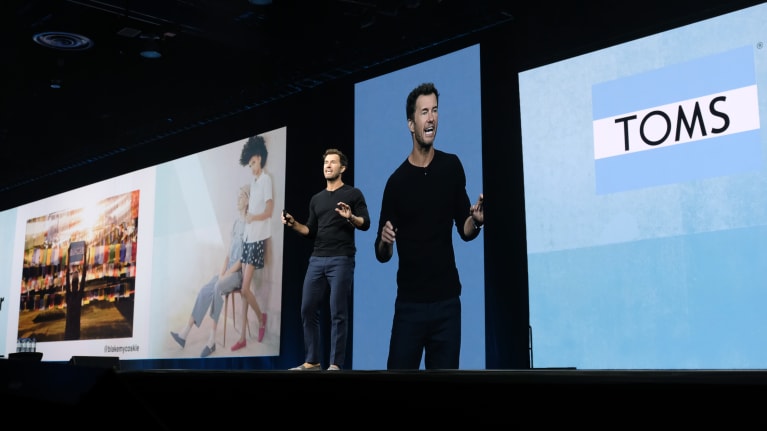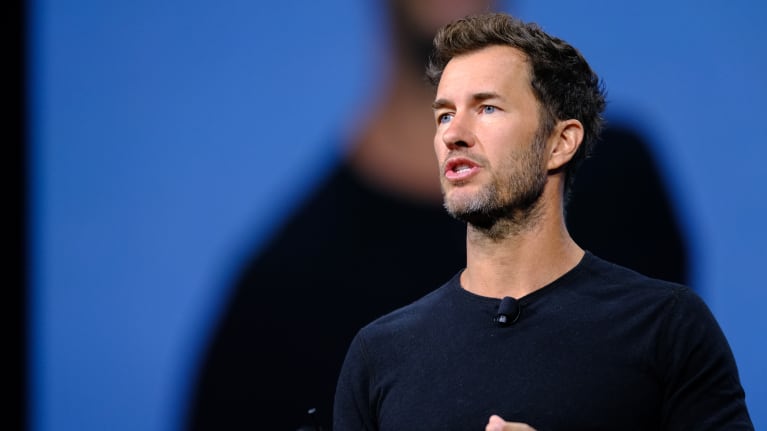TOMS Founder Blake Mycoskie Encourages Self-Help After Depression Diagnosis
To care for others, care for yourself first
LAS VEGAS—Blake Mycoskie, the founder of TOMS, proved to the world that giving is good for business.
By donating to those in need with each customer purchase, he started a movement 13 years ago that other companies have followed.
However, the company's rapid growth also took a personal toll, on his health.
"I believe you cannot take care of others until you take care of yourself," Mycoskie told thousands of HR professionals gathered at the June 26 closing general session of the Society for Human Resource Management (SHRM) 2019 Annual Conference & Exposition.
Mycoskie told the group that he was diagnosed five years ago with mild depression, which he said he hadn't discussed publicly before.
His battle with depression prompted his next mission: He plans to launch a self-help toolkit next year "to help people live their best lives." And he urged HR professionals to focus on self-care as well, so they can continue to help other employees.

Helping others has always been a central theme in developing TOMS, a for-profit business that began with the selling of shoes but has since branched out into eyewear, bags and coffee.
"Having a purpose was critical for building a business back then and is even more so today," he said.
The idea for TOMS came to him during a visit to Argentina in 2006. He helped a volunteer group there distribute donated shoes to children who didn't have any. But he wondered afterward where they would get their next pairs. He brought some shoes made by local Argentinian shoemakers home to California, where his idea for making a contribution with each purchase captured headlines and was amplified by social media.
"When you put giving at the center of a business, something bigger than just making money, your customers become your biggest marketers. They're so proud of supporting your brand that they tell everyone about it," he said.
His company's mission also helped attract and retain workers. When he first started out, he had employees who had come from large, prominent companies. He asked one why he made the switch, and the employee said, "Now I can tell my teenage daughter what I do, and she's proud of it."
He recognizes that not every company can replicate his model of making a contribution with each purchase.
"But what I found is that almost every company can give employees an opportunity to serve their communities and give back," he said, "and when they do, it creates an incredible bond. When people serve together, they stop thinking about the petty office politics and all that stuff."
Since 2006, TOMS Shoes has provided more than 60 million pairs of shoes to children in poor, underdeveloped regions of the world. TOMS Eyewear has provided eye exams and medical care to more than 400,000 people since 2011. And TOMS Roasting Co. has provided more than 335,000 weeks of safe water since 2014. In 2015, TOMS Bag Collection was founded to train birth attendants and has supported safe birth services for more than 25,000 mothers.
However, in 2013, TOMS sales hit a plateau, and Mycoskie noticed a shift in the company's culture—from the fun startup it once was to a more traditional, professional company.
"I saw more people were burned out, they were stressed, and they were less committed, and that really worried me," he said.
In contrast, when he traveled to other countries on "giving trips," he saw local residents who had little material wealth but a deep joy and connection with family.
He read the statistics: In the U.S., 1 in 6 people take antidepressants, 40 million people experience anxiety, and 44 percent of employees say they are burned out. He realized he was experiencing some of these symptoms himself.
"I had spent the last eight years checking all the boxes. The things that my parents and culture and the media said would give me lasting happiness was what I had pursued. I started a company that was meaningful and that helped others. I married an amazing woman and started a family. But in doing so, I realized I had sacrificed my own personal well-being."
He said he was overworked, always stressed and constantly distracted by electronics.
"I was rarely present for my wife and family. I was always tending to 'urgent' business needs," he said. "For the first time in my life, I was diagnosed with mild depression. But the reason I share that now is that anyone who is experiencing that feels alone, because that's how I felt. It's really important we're honest about that."

As he researched his problem, he said, he realized his focus was on the symptoms of depression, rather than on lifestyle changes that would free him from the traps of modern living and the pressures he felt at work.
Ultimately, he partnered with researchers who identified 10 habits that can improve a person's well-being. In late 2020, they plan to launch a project called "Madefor," based on the belief that "we are all made for more."
The habits aren't quick fixes but must be practiced over time. Some seem commonsensical but are difficult nonetheless—such as putting away digital devices to get enough sleep.
Mycoskie challenged HR professionals to choose small, positive changes in their daily routines so they can take better care of themselves.
"How can we be the champions of our people unless we take care of ourselves first?" he asked.
After his speech, conference attendee Amberley Sacalas, vice president of KHS&S Contractors in Anaheim, Calif., said she found Mycoskie's message uplifting, especially his call to "focus on the small things you can do instead of having to eat the whole elephant at one sitting."
Keri Hunt, HR business partner at Akron Children's Hospital in Ohio, said Mycoskie's "passion for what he does is inspiring. He has an amazing story." Hunt, who was wearing a pair of TOMS shoes, had heard him speak at a prior SHRM conference. This time, she brought her husband, a pastor, to hear him, as well.


